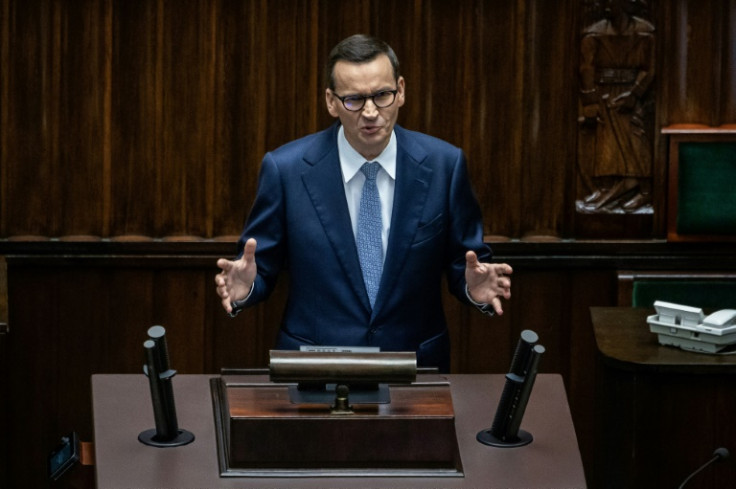
Poland's pro-EU parties scored a first win in the new parliament Monday after general elections in October with their candidate elected speaker of the lower house, the country's second most important post.
Szymon Holownia won the vote widely seen as a litmus test for three parties bidding to form a government and oust the conservative and populist Law and Justice (PiS) party.
"After this vote, no one can doubt that there is a majority in this parliament ready to take power," said Holownia, a former TV host who launched his own centrist party.
He got 265 votes against 193 for the PiS candidate Elzbieta Witek in the 460-seat house.
The parliament speaker's post is the number two position in the country as per the constitution. The speaker replaces the president in case of death.
The first parliament session after the election comes as both the opposition and governing populists bid to take power.
The PiS fell short of a ruling majority despite finishing first in the election -- but was given the first shot at forming the government by conservative President Andrzej Duda.
In his opening speech to parliament, Duda declared his "readiness" to cooperate with new lawmakers as he praised his PiS allies for the "eight good years" they had spent in power.
Duda had earlier said he would ask current Prime Minister Mateusz Morawiecki to form a government, a task analysts say he has no chance of fulfilling.
Morawiecki formally resigned on Monday but is expected to be officially tapped as the prime ministerial candidate in the evening.
In a eurosceptic speech to lawmakers, Morawiecki sought to win over support from the opposition, claiming Polish "sovereignty" and "independence" were at stake.
Three pro-EU parties led by ex-prime minister and former European Council president Donald Tusk won enough votes for a majority and are gearing up to form a government, though they first will have to wait for PiS's efforts to fail.
"This is an unprecedented situation in more than 30 years of the history of democratic Poland," said Stanislaw Mocek, a sociologist and president of the Collegium Civitas university in Warsaw.
PiS holds 194 seats in the lower chamber, compared to 248 seats for the pro-EU opposition.
PiS has said it will "do everything" to be able to form a new government within the constitutionally allocated 14 days.
It will then have to pass a vote of confidence within 14 days.
"This mission is destined to fail," Mocek said, adding that PiS was just "playing for time" to receive additional financing, put their people in key posts and "ensure a soft landing" when it goes into the opposition.
Jaroslaw Kuisz, a political analyst, said PiS could simply "wait" for its next chance and "sow discord between allies" in the pro-EU coalition likely to form the next government.
The leaders of the pro-EU parties -- including one co-headed by Holownia -- signed a formal coalition agreement on Friday to serve as a "roadmap" for the alliance once it comes to power.
"We really wanted Polish women and men... to see that we are ready to take responsibility for our homeland and for the coming years," Tusk said.
Wlodzimierz Czarzasty, a co-leader of the bloc's Left party, said "the most important thing now is to make Poland tolerant, open, law-abiding, responsible", calling for Warsaw to have a "strong place" within the European Union.
The agreement presents the coalition's position on key issues like the economic and environmental management of the country, rebuilding good relations with the EU, reforming state media, separation of Church and State, and abortion.
If Morawiecki fails to form a government, the next candidate would be nominated by the parliament.
Analysts estimate that the current opposition would only be able to take power from mid-December.
© 2025 Latin Times. All rights reserved. Do not reproduce without permission.




